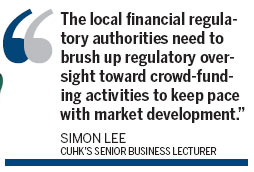Crowd pleaser
Updated: 2013-08-30 07:45
By Oswald Chan(HK Edition)
|
|||||||


The Internet today engulfs nearly all aspects of economic life. People bank online, they shop online and they market their products and services on line. Now they even engage in online fund-raising. Easier access to capital, cost-effective marketing and promotion channels as well as feedback from potential users are some of the benefits of online "crowd-funding". Oswald Chan reports.
Tofu Monologue founder Claire Lee wants to publish a book promoting non-violent approaches to violence in everyday life. She's also wants to mount an exhibition to raise public awareness but she still needs money. Hong Kong may be renowned for its robust financial environment, but few know about crowd-funding. It's a big deal globally, but it's hardly made a dent here. It's an online approach to raising small contributions of investor capital from many people - from "out there" among the crowd.
Lee had 55 percent of what she needed when she heard about crowd-funding and decided to try to raise the rest of the capital she needed online - facing an October deadline. "Of course I need to secure funding online to cover the project's operating costs," Lee tells China Daily.
If she gets the money, she'll have to make good on all the promises she made to prospective investors on her funding website.
"But the platform can accomplish more than just fund-raising," she continues. "It can offer a channel for delicate exchanges between project developers and their financial donors."
Giving back
Depending on the level of financial donation, Lee will "provide different experience levels" to the financial donors. Lee will invite HK$200 ($25.8) financial donors to attend the Tofu art exhibition's opening and book launch. For an HK$800 donation, Lee will organize a tea gathering for a discussion about non-violent approaches. And for anyone who donates HK$4,000, Lee will cook a tofu meal for up to four people.
"I will face the donors directly when I deliver on my promises. I think it's a valuable platform for sharing ideas so people are aware of the level of violence in society and even learn why I use tofu as the symbol of non-violence," Lee says.
"Fund-raising on the Internet can make my project more influential and help disseminate the message of non-violence," Lee adds.
Local software game developer, Fingerprint Studio Ltd uses the online platform to promote its products. The local business community, otherwise, has shown little support for local game designers. Games designed overseas may become hot sellers but the games produced by Hong Kong designers generally are ignored.
The company posted its self-developed "Dr Mixinstein" online, to check out the electronic platform. With a September deadline looming it's raised 25 percent of its objective.
"Our online crowd-funding exercise is purely symbolic as we are attempting to raise only HK$30,000. We just want to test the water," Fingerprint Studio Ltd's founder Dixon Cheung tells China Daily
"Through the online crowd-funding platform, we can attract publicity for our company. After we posted our project, we started hearing from more game design companies and got a lot of feedback from local consumers to help us improve our product design. All these help to build our business networks and soliciting consumer feedback," Cheung notes. "Online fund-raising can raise local awareness of the game design industry, which up to now has had little access to market resources."
If the Dr Mixinstein experiment proves successful, the game design company may up the ante and seek funding for a bigger project, for a more sophisticated game.
Online crowd-funding draws investments from people who support a specific idea, like a new product or business. The Internet channel is an alternative to traditional means of fund-raising, such as bank loans. FringeBacker and Dreamna, two Hong Kong-based companies are players in the reward-based crowd-funding platform.
FringeBacker has helped more than 10 business and cultural project entrepreneurs to raise funds since its start up early last year. In June, the online fund-raising portal raised HK$480,000 to help horse rider Jacqueline Lai return to international equestrian competition. The initiative was the largest fund-raising effort on the FringeBacker platform so far.
Lai was hurt in Feb 2011 when the horse she was riding fell back on her. After recovering, Lai was determined to resume participating in equestrian competitions. Lai posted a funding request for HK$300,000 in April this year, her story impressed many people and drew more funding than expected to support her training, entrance fees and transportation costs to get her back into competition.
FringeBacker does due diligence before posting a project, checking the backgrounds of principals seeking to list offerings and making certain project objectives are sound. The online website protects investors with a "100 percent refund" assurance. If a project fails to meet its fund-raising target, the principals behind the project are required to refund all the money contributed by donors.
"Project operators can draw more than capital from online fund-raising," FringeBacker Executive Director Maryann Hwee tells China Daily. "In order to get a better market response, project owners have to learn how to present their projects or businesses. That's a cornerstone of raising business capital. They also are able to build their operations networks, peer support and customer bases during the process."
"The platform can offer more chances of success to those project operators with small business networks and few market resources." Hwee notes.
Besides the trading of benefits, Hong Kong has the funding platform where investors may buy the shares of private start-up companies.
Diversifying investment
Colony 88 is the city's first online equity crowd-funding platform specializing in facilitating private equity investments in early stage companies and startups. Colony 88 is helping QVIVO, a locally-based cloud media company, to raise money through its online platform. Local investors have so far shown a favorable response.
Looking ahead, Colony 88 has a pipeline of private startups, ranging from hospitality and restaurant chains to technology firms, all of which are exploring the possibilities of conducting online crowd-funding campaigns.
The appeal to the online community at large offers different financial rewards to investors and fund-raising companies.
Investors are able to build up portfolios of long-term, alternative and private investments in early-stage companies, diversifying the risk of individual investments and creating more balanced investment portfolios that reach beyond traditional real estate and stock market investments.
Companies seeking to raise funds can secure capital to expand their businesses. Investors who believe strongly enough in the companies they invest with are likely to become ambassadors helping to promote those companies.
There are limitations. Equity crowd-funding is not a good idea for companies with sensitive intellectual property. Business ideas floated on the Internet can instantly be ripped off and taken into full production by other companies with more solid financial grounding.
"These new, democratized forms of finance can be hugely beneficial for Hong Kong because the online crowd-funding process is transparent," Colony 88's Co-founder Jono Lilley tells China Daily.
Another online fund-raising platform is Dreamna. Its founder Ka Chan tells China Daily that "the rise of online crowd-funding would not mean venture capital/private equity (VC/PE) will lose its luster in Hong Kong because VC/PE will continue to bring operational expertise, network, product knowledge and management experience to the startups."
Online fund-raising platforms are starting to grow in Hong Kong, but the industry still is not formally regulated. Financial regulators should start asking whether there is a need to regulate the industry to facilitate better market development.
The Securities and Futures Ordinance usually holds for crowd-funding endeavors.
"Local financial regulatory authorities need to brush up regulatory oversight toward crowd-funding activities to keep pace with market development," Chinese University of Hong Kong Faculty of Business Senior Lecturer Simon Lee says.
"It (online crowd-funding) is not formally regulated in Hong Kong, but there are elements of any fund-raising effort that fall within Hong Kong legislation." Colony 88's Lilley notes. "We fully support local financial regulators working with the sector to ensure the legal protections are in place to protect the investors."
Contact the writer at oswald@chinadailyhk.com
(HK Edition 08/30/2013 page5)